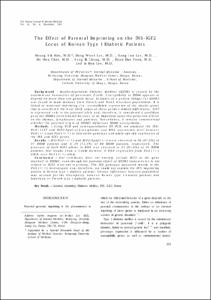The effect of parental imprinting on the INS-IGF2 locus of korean type 1 diabetic patients
- Keimyung Author(s)
- Kim, Heung Sik; Lee, In Kyu; Chang, Sung Ik
- Journal Title
- Korean Journal of Internal Medicine
- Issued Date
- 2001
- Volume
- 16
- Issue
- 4
- Keyword
- Genomic imprinting; Diabetes Mellitus; INS; IGF2; Korea
- Abstract
- Background : Insulin-dependent diabetes mellitus (IDDM) is caused by the autoimmune destruction of pancreatic β-cells. Susceptibility to IDDM appears to depend on more than one genetic locus. Evidence of a genetic linkage for IDDM2 was found in male meioses from French and North American populations. It is linked to maternal imprinting (i.e. monoalleleic expression of the insulin gene) that is considered the most likely cause of these gender-related differences. IGF2 is expressed only in the paternal allele and, therefore, is considered a candidate gene for IDDM2 transmission because of its important autocrine/paracrine effects on the thymus, lymphocytes and pancreas. Nevertheless, it remains controversial whether the parental origin of IDDM2 influences IDDM susceptibility. Methods : Using PCR and semi-quantitative RT-PCR, we analyzed the INS/PstI+1127 and IGF2/ApaI polymorphisms and RNA expression level between PstI (+/−) and PstI (+/+) to determine genotype and allele-specific expression of the INS and IGF2 genes. Results : INS/PstI (+/+) and IGF2/ApaI (+/−) were observed in 36 (97.3%) of 37 IDDM patients and in 29 (72.5%) of 40 IDDM patients, respectively. The presence of both IGF2 alleles in RNA was observed in 21 (91.6%) of 24 IDDM patients. Our results show a 3-fold increase in RNA expression from PstI (+/−) allele over PstI (+/+) allele. Conclusion : Our conclusion does not entirely exclude IGF2 as the gene involved in IDDM2, even though the parental effect of IDDM2 transmission is not related to IGF2 maternal imprinting. The INS genotype appeared mostly in the PstI (+/+) homozygote and, therefore, we could not explain the INS imprinting pattern in Korean type 1 diabetic patients. Genetic differences between populations may account for the discrepancy between Korean type I diabetic patients and American or French type I diabetic patients.
- Publisher
- School of Medicine
- Citation
- Heung Sik Kim et al. (2001). The effect of parental imprinting on the INS-IGF2 locus of korean type 1 diabetic patients. Korean Journal of Internal Medicine, 16(4), 223–229. doi: 10.3904/kjim.2001.16.4.223
- Type
- Article
- ISSN
- 1226-3303
- 파일 목록
-
-
Download
 oak-aaa-03437.pdf
기타 데이터 / 164.94 kB / Adobe PDF
oak-aaa-03437.pdf
기타 데이터 / 164.94 kB / Adobe PDF
-
Items in Repository are protected by copyright, with all rights reserved, unless otherwise indicated.